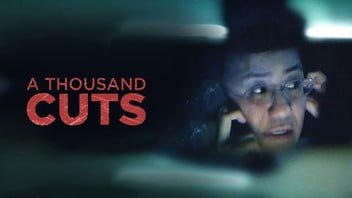
A Thousand Cuts
Social media platforms designed to promote freedom of expression are being used all over the world to silence journalists, nowhere more so than in Rodrigo Duterte’s Philippines, a country that serves as a warning for how modern technology can allow violent, hateful regimes to crush their enemies.
How Donald Trump has delegitimized his critics with cries of “Fake News” is a connection never made explicit by Ramona Diaz’s documentary A Thousand Cuts but it doesn’t have to: The film knows this isn’t just a crisis that happens “somewhere else.” It’s occurring in societies all over the globe as unscrupulous individuals in positions of power weaponize social media networks to destroy people and institutions. A Thousand Cuts doesn’t warn about what might happen in America; it sounds an alarm for what is happening everywhere.
Diaz shows an impressive ability here to edit hours and hours of footage on complex subjects into concise works of nonfiction filmmaking that often make their points simply by bearing witness to history in the Philippines. She charts the rise of Rodrigo Duterte’s campaign of violent intimidation, making it clear how he won by promising vengeance and turning Manila into a blood soaked hellscape where his people murder anyone involved in drugs.
Like any good dictator, he rose on fear only he could protect innocent citizens from this wave of crime sweeping across his land. At first, people like Maria Ressa and her organization Rappler were there to speak truth to power, posting investigative reports about Duterte’s regime and even interviewing him.
A Thousand Cuts opens with Diaz already showing she has a strong handle on all the moving parts here without ever simplifying them or letting them get away from her. Her team was granted remarkable access within the Duterte administration itself underlings who helped drive social media campaigns for the President were happy to sit down with cameras rolling and talk about how they did it; some blindingly loyal ones that were designed to boost Duterte, and some threatening, vile ones that were designed to target his enemies.
And she spends time with future politicians who have clearly been enabled by Duterte’s rhetoric including a police chief who tries to use the drug war as a stepping stone and a social media darling who clearly sees Insta-fame as a path to actual power. Again, Diaz never overplays this hand but it’s hard not to watch A Thousand Cuts and wonder how many of these she might be filming in 10 or 20 years.
All the same, “A Thousand Cuts” returns to Ressa, who keeps hope in throughout even being arrested and charged by Duterte himself. “A Thousand Cuts” is a thriller because there’s so much at stake in Duterte’s assault on journalism including death threats on social media and you’re constantly worried about what might happen to Ressa next. Her life is in actual danger; I was concerned that it would end with a tragedy borne out of the inevitable swing between extremes where the press becomes the enemy.
Diaz gets some shots of worry or doubt flitting across Ressa’s face, but she’s beyond an inspiration: She fights against a rising tide that shows no sign of cresting. And indeed, the movie isn’t over yet; it premiered at Sundance and closes with a coda from a recent ruling involving Ressa dated June 2020.There’s an immediate tension here, too, as there was in Laura Poitras’ documentary about Edward Snowden, “Citizenfour.”
There have been many films lately too many released about the state of journalism and free speech around the world. “A Thousand Cuts” distinguishes itself through Diaz’s laser-like focus on and deep understanding of what has happened to journalism under Duterte in the Philippines while also making it clear that this could happen anywhere else.
The film serves as both explanation for what is happening in The Philippines now and how it can be applicable worldwide if we are not careful. It is one thing to watch a brutal nightmare unfold before your eyes; it is another to see one with such resilient hope at its center. In terms of content alone, one of the most powerful moments comes when Ressa takes Martin Niemöller’s classic Holocaust poem and turns it into something we all need to consider: We don’t know what happened after they came for journalists.
Watch A Thousand Cuts For Free On Gomovies.
.jpg?w=1024&resize=1024,1024&ssl=1)
.jpg?w=1024&resize=1024,1024&ssl=1)
.jpg?w=1024&resize=1024,1024&ssl=1)
.jpg?w=1024&resize=1024,1024&ssl=1)
.webp?w=1024&resize=1024,1024&ssl=1)
.jpg?w=1024&resize=1024,1024&ssl=1)
.jpg?w=1024&resize=1024,1024&ssl=1)
.jpg?w=1024&resize=1024,1024&ssl=1)